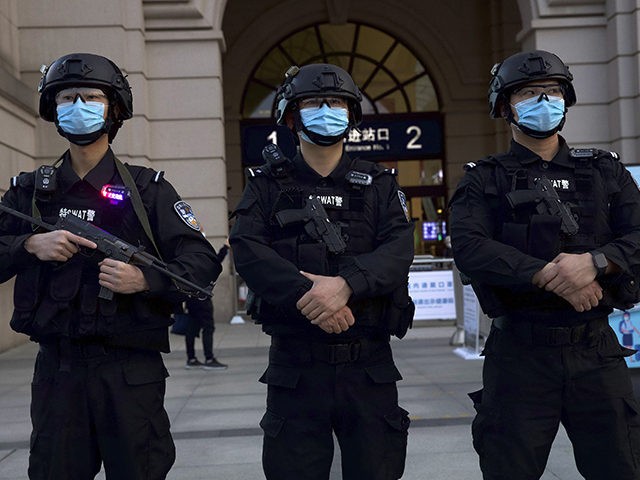Human rights watchdog Bitter Winter on Saturday criticized the government of China for its long-standing, but increasingly abusive, practice of classifying human rights activists, religious believers, and other dissidents as “mentally ill” and holding them in psychiatric hospitals where they are kept docile with drugs.
Bitter Winter described one impoverished man who journeyed to Beijing to ask the government for help and wound up in a mental hospital:
Three generations of a family live together in extremely impoverished conditions in a village administered by Zibo city in the eastern province of Shandong. On top of that, the wife of the head of the household is disabled, so he has repeatedly applied to the local government for subsistence allowance but was refused each time. In 2018, the man decided to go to Beijing to petition the central government. Instead of solving his family’s problems, he was arrested by Public Security Bureau officers and taken to a psychiatric hospital.
The man recalled that in the hospital, he was tied to a bed when he refused to take the medication the doctors gave him. After a few such incidents, he gave up and decided to take the pills himself to avoid being tied up. He later learned that his town’s authorities had instructed the hospital to force him to take the drugs. When he was released after a month, his mental condition was visibly affected. Since then, he became a target of the government’s surveillance. In September 2019, the police came to his house again, threatening to give him a hefty sentence if he petitioned again.
One staffer at a psychiatric hospital said quite a few patients arrive in shackles with bags over their heads and leave in much worse shape than how they arrived:
“The hospital treats them regardless if they are ill or not, as long as they are sent here,” the employee explained. “If they refuse to take drugs, we’ll force them. The government does not tolerate petitioners; they call them ‘mentally ill.’ When they are sent here, their mental condition is normal, but it deteriorates after the ‘treatment.’”
He remembered an elderly man who was brought to the hospital three times for petitioning in Beijing. His family had to pay all his medical expenses. The third time, he was only released after his family wrote a statement promising that the man would not petition again.
“Very few people held here are actually ill,” the employee said. “It may look like a hospital, but in reality, it is no different from a prison. The gate is secured with several big iron chains, so there is no way to escape. To keep patients weak, the hospital only gives them little food.”
Religious believers described “shock therapy” designed to torture them into recanting their faith, especially if they belong to what Beijing views as particularly troublesome religions like the Church of Almighty God (CAG), also known as “Eastern Lightning” or Quannengshen.
CAG is regarded as a dangerous cult by Chinese authorities and has been subjected to several major crackdowns since a 2014 incident where a group of its followers beat a woman to death at a McDonald’s restaurant. CAG members get very little in the way of due process from Chinese authorities. Many have fled to other countries claiming the Chinese Communist Party (CCP) is persecuting them because it perceives them as a political threat.
“A doctor told me that because of my faith, I was a mental patient, and there was no need for further tests,” one CAG member recalled of her treatment at a mental hospital, where she was confined for almost half a year.
One of the most notorious hospitalized dissidents was Dong Yaoqiong, a 28-year-old activist who became known as the “Ink Girl” in the summer of 2018 by uploading video of herself defacing a billboard of Chinese dictator Xi Jinping and calling him a tyrant.
Dong’s last communique to her fans after the video went viral was a social media post that said people in uniforms were knocking on her door. A year later she emerged from a mental hospital with pronounced side effects from heavy antipsychotic medication. As her father ruefully observed, she was of sound mind when the CCP threw her in a mental hospital, but she emerged after a year of drugging with symptoms of dementia.
China has an entire system of mental hospitals administered by the Ministry of Public Security known as Ankang, which means “peace and health.” Human rights violations have been constantly alleged against these institutions since they began operating in the late 1980s. Arbitrary detentions lasting for years have been reported, frequently coupled with “deprogramming” efforts and outright torture.
Chinese mental hospitals are shrouded in secrecy, but human rights advocates say hundreds of people are committed for political reasons on any given day, often without trials or public hearings. The CCP itself has mused in state-run media that a hundred million Chinese citizens have various forms of “mental illness.”
The government allegedly pressures families into agreeing with the commitment of political dissidents or keeping them in jail by refusing to accept responsibility for them if they were released. People of limited means can be kept incarcerated in mental hospitals indefinitely by threatening to bill their families for years of expensive “treatment” if they are released.

COMMENTS
Please let us know if you're having issues with commenting.